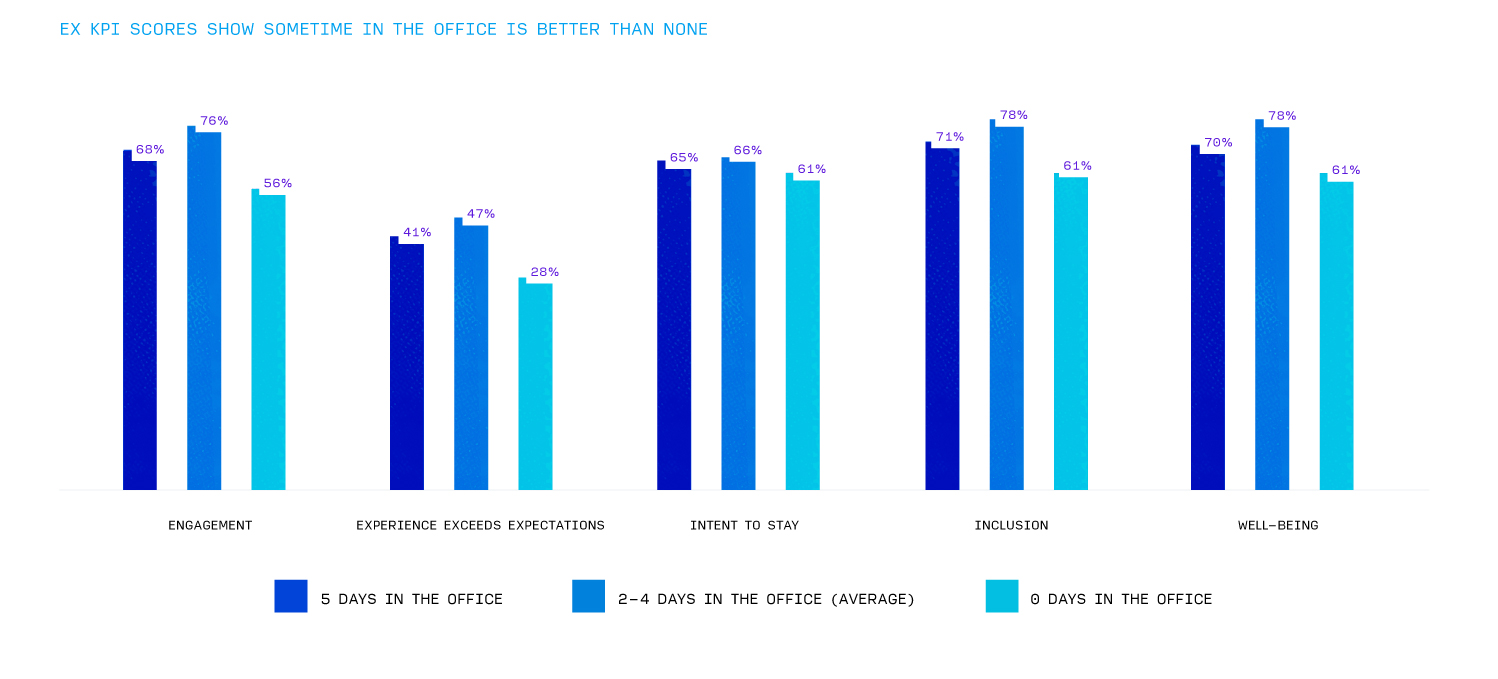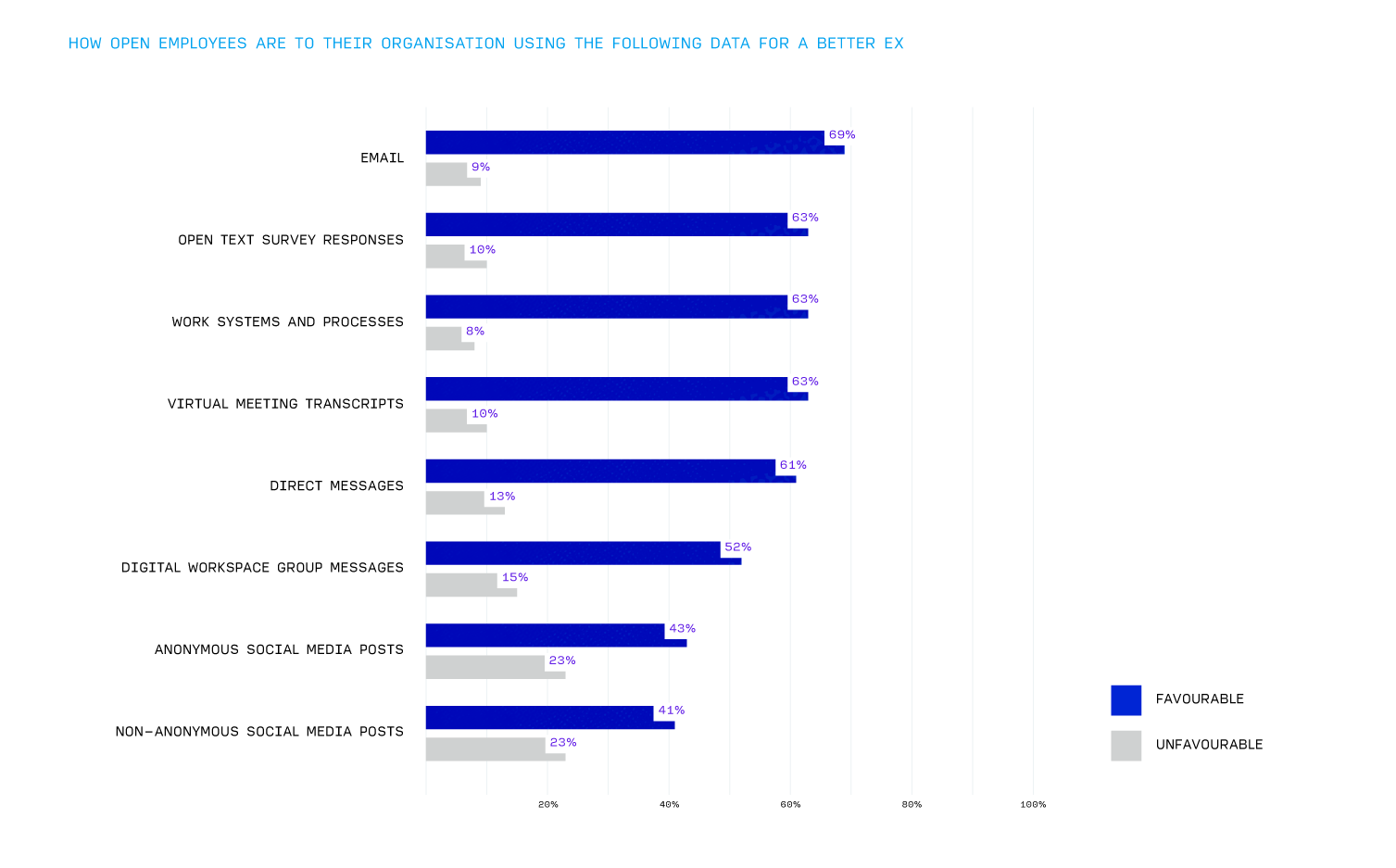2024 work trends unveiled: 5 key employee experience shifts that lies ahead

As we approach the threshold of a new year, 2024, we find ourselves reflecting on the experiences and lessons learned throughout 2023 while eagerly anticipating what the future holds. In the realm of employee experience, the past year unfolded as a period marked by disruptions, transformative learning, significant technological advancements, and the emergence of unconventional workplace trends, among other notable developments. However, as we stand on the brink of 2024, a question looms large: What can employees and leaders expect in 2024?
In today's ever-changing world, employees want their employers to help them find a good balance in their work lives. Many employees are okay with working both in the office and from home, using new technology, and sharing more about their work experiences. However, they want these changes to be meaningful and benefit both them and the company.
Finding this balance is important because it can make a company more competitive. In many countries in Asia Pacific and Japan, where they are focused on being more productive and growing economically, having a great work experience is one of the best things a company can do. Research has shown that when employees are engaged and happy, it helps the company in many ways, like making more money, being more productive, and keeping customers satisfied.
But here's the challenge: Some experts think that in 2024, there might not be as much money to spend on programs to make employees' work experience better. This means it's even more important to make sure that the things companies do for their employees help the business succeed. That's why Qualtrics shared the five big trends that will shape work in 2024.
5 trends that will shape work in 2024
In the Asia Pacific and Japan (APJ) region, the key factors that indicate an ideal employee experience include:
- Engagement,
- Surpassing expectations in experience,
- Intent to stay for 3 or more years,
- Inclusion,
- Well-being
These factors have remained relatively stable over the past year, suggesting that the improvements seen during the pandemic have reached a plateau. However, some countries, such as Australia and New Zealand, Malaysia, and Thailand, have experienced notable declines in these indicators. In 2023, employee engagement was primarily driven by themes related to effectively serving customers, with employees feeling empowered to find innovative ways to enhance customer service.
Looking ahead to 2024, employee engagement will be influenced by themes cantered on personal growth and development. Additionally, well-being will be enhanced by ensuring that jobs make effective use of employees' skills and abilities, fostering an environment of respect and safety at work, and promoting integrity in the workplace.
1. Balancing work and life: The hybrid work advantage
As more companies discuss the return to the office, Qualtrics research shows that employees who work in hybrid arrangements, meaning part-time in the office and part-time at home, tend to be more engaged, want to stay longer with the company, feel better, and experience greater inclusion compared to those who work only in the office or only from home. There are a few reasons for this.
Some like to be in the office to connect and work with colleagues face-to-face. Others prefer clear boundaries between work and home life. And some just like having a routine outside their home. To make sure these hybrid work plans support both employees and the company's goals, employers should be flexible. This means allowing managers and leaders to create work plans that make the most sense for their teams and individual employees. They should also set some basic expectations to ensure the best results for everyone.

2. Workers prefer AI assistance over evaluation
In the workplace, AI has become a prominent topic of discussion. Qualtrics research in the Asia Pacific and Japan (APJ) region revealed that employees are generally comfortable with the use of AI, and they are among the most willing globally to embrace it, as long as they can maintain a sense of control. They welcome AI for tasks such as writing, acting as a personal assistant, or providing assistance with internal queries.
However, their comfort levels decline when AI is involved in activities like performance evaluations or hiring decisions. One of the most intriguing findings is the connection between employee engagement and the willingness to embrace AI. The more engaged an employee is, the more open they are to the idea of using AI in their work. As AI adoption continues to accelerate, enhancing employee engagement becomes crucial if organisations and their teams aim to unlock the full potential of AI in the workplace.

3. Employee comfort levels with data sharing
Many employees express comfort with sharing their work-related emails, chat messages, and other communications to enhance their employee experience, but their feelings are more mixed when it comes to using their social media posts. This might come as a surprise to some, but employees are willing to allow their employers to passively listen to their work-related emails, processes, virtual meeting transcripts, and chat messages in exchange for an improved Employee Experience (EX).
Passive listening, in this context, does not involve snooping or monitoring productivity. Instead, it revolves around analysing communication patterns to gain a better understanding of employees' daily experiences. For example, it can help employers determine how the timing and frequency of messages, emails, or meetings relate to an individual's or team's engagement and well-being.
However, this approach naturally raises concerns about transparency, data control, and potential misuse. This is why having proper governance in place is crucial for passive listening. Building trust through transparent data usage and involving employees in decision-making processes is essential to address these concerns. For HR leaders and teams, passive listening represents a significant shift in how they collect and respond to employee feedback. While traditional methods like surveys will remain important in Employee Experience (EX) programs, relying solely on surveys is no longer sufficient for capturing timely and meaningful insights.

4. The end of the new job honeymoon phase
In the past, employees typically felt more engaged during their first year in a new job. However, in 2024, the opposite is often true: new hires tend to have the lowest levels of engagement, feelings of inclusion, and well-being, and are more likely to leave. This trend has been gaining momentum in recent years. This trend is a cause for concern for organisations. Losing a new hire is costly for various reasons, including the fact that the business hasn't yet realised the full value of the hire, and the expenses associated with finding, interviewing, hiring, and onboarding are all wasted. In today's competitive labour markets, organisations must prioritise creating a positive new employee experience to retain the valuable talent they've worked hard to attract.
To enhance the experience for new employees, a key focus should be on improving onboarding programs. Employers need to ensure that onboarding programs are tailored for remote, hybrid, and on-site employees. It's about aligning the new hire experience with their expectations. The initial months should not merely consist of ticking items off an onboarding checklist; new hires should also see opportunities for growth and development, which are fundamental drivers of Employee Experience (EX).

5. Challenges faced by frontline employees: A call to action
Frontline or customer-facing employees, including healthcare workers, educators, and retail workers in the Asia Pacific and Japan (APJ) region, often serve as the direct link between an organisation and its customers. They play a vital role in delivering exceptional customer experiences. However, Qualtrics research revealed that these frontline employees have the lowest morale and feel the least supported and trusting. This highlights the need for employers to take immediate action by paying closer attention to their frontline employees. These employees are the closest to the customers, making it crucial to understand their needs, experiences, and tap into their ideas for enhancing customer outcomes.

In 2024, another year of transformation lies ahead. The methods of team collaboration, the tools at employees' disposal, and the standards they hold will continue to develop. To effectively and assuredly adapt to this transition, the ability to swiftly and profoundly comprehend and meet the needs of workers is paramount. This capacity will empower leaders and their teams to achieve optimal results, while clearly establishing the connection to business outcomes – a crucial aspect, especially as Employee Experience (EX) investments and programs face increased scrutiny. In today's economies, EX plays a pivotal role in driving growth, and organisations that maintain a strong focus on their people will undoubtedly emerge as top-performing entities in the years to come.
















